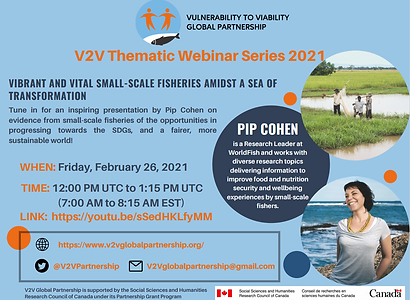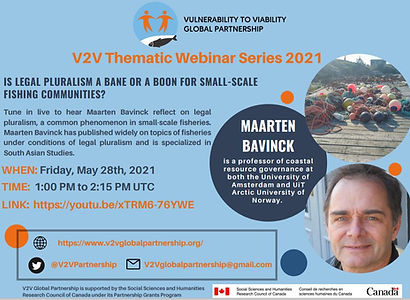V2V THEMATIC WEBINAR SERIES 2021
V2V JANUARY THEMATIC WEBINAR
Trade In Seafood and Its Impacts on The Livelihoods and Food Security In Developing Countries
One can categorize seafood trade into three buckets: (i) legitimate trade via the market (imports and exports).; (ii) legitimate trade on the water via access agreements; and (iii) illicit trade of illegal, unreported, and unregulated (IUU) caught fish. Each of these different ways of trading seafood has economic (e.g., foreign exchange earnings); equity and social impacts (e.g., loss of incomes and livelihoods of local fishing communities; and increase in food insecurity (e.g., developing countries exporting high-quality nutrient-rich fish and importing low-quality fish for local consumption). This talk will summarize and synthesize the existing literature on each of these categories of trade in seafood, the resulting flow of trade, and provide insights on trade impacts, positively or negatively, on the livelihoods and food security of people living in developing countries.
Click on the poster for more details
V2V FEBRUARY THEMATIC WEBINAR
Vibrant and Vital Small-Scale Fisheries Amidst A Sea of Transformation
In this presentation, Pip Cohen presents evidence from small-scale fisheries of the opportunities in progressing towards the SDGs and a fairer and more sustainable world. These include nutrition-sensitive governance, gender transformative approaches, and the foundation of collaborative governance. She seeks to provide some insights, and to stimulate a discussion on the question, “what is the position of small-scale fisheries, and associated research, amidst a powerful tide of transformation?”
Click on the poster for more details
V2V MARCH THEMATIC WEBINAR
Co-Existence of Legal and Illegal Supply Chains For Marine Fisheries
Border disparities and multidimensional poverty are characteristic of some areas in Papua New Guinea. In the remote and isolated area of the South Fly, high-value marine products (shark fin, beche de mer, fish bladders, and mud crabs) are illegally traded into a growing Asian market. Uncovering the characteristics of both the illegal value chains alongside legal ones, and finding out motivations for engagement in either one, is the first step towards sustainability.
Click on the poster for more details
V2V APRIL THEMATIC WEBINAR
Vulnerability and Viability of Small-Scale Fisheries: Drivers and Prospects
In this presentation, Pip Cohen presents evidence from small-scale fisheries of the opportunities in progressing towards the SDGs and a fairer and more sustainable world. These include nutrition-sensitive governance, gender transformative approaches, and the foundation of collaborative governance. She seeks to provide some insights, and to stimulate a discussion on the question, “what is the position of small-scale fisheries, and associated research, amidst a powerful tide of transformation?”
Click on the poster for more details
V2V MAY THEMATIC WEBINAR
Is Legal Pluralism A Bane or A Boon For Small-Scale Fishing Communities?
Legal pluralism – or, a condition whereby multiple legal systems apply to one and the same situation – is a common phenomenon in small-scale fisheries. Not only do we find governmental law exercising authority, but there is customary law and international law too. Many attempts are being made to harmonize these different law sources. But is this always a good thing? Is customary law no more than a relic of the past, or does it help to protect small-scale fishers?
Click on the poster for more details
V2V JUNE THEMATIC WEBINAR
Governance Reflections about the Paradise: Crisis and Opportunities in the Galapagos Islands
The Galapagos Islands have been perceived to be one of the most popular nature-based tourism destinations in the world. During the last five decades, this 'paradise' on earth has gone through a process of growth, mainly based on an economic model developed and fully reliant on nature-based tourism. In early 2020, however, the entire Galapagos archipelago was 'closed' for four months, due to the COVID19 pandemic, with a decrease in the arrival of tourists and thus, on the economic benefits for the local economy. This caused a crisis that still is felt at a local level but this situation has also contributed to varied initiatives and good examples of resilience and adaptation, that have strengthened the human society in the islands. Additional consequences are still unforeseen, mainly due to the uncertainty on how tourism and other economic-related activities will be addressed in the immediate future. This talk will explore those challenges but also will illustrate some opportunities that have been driven by the crisis.
Click on the poster for more details
V2V JULY THEMATIC WEBINAR
An Intersectional Lens on The Costs and Benefits of Compelled Migration As An Adaptation To Environmental Degradation
Migration is a common adaptation to environmental degradation. Environmental migration can be undertaken by individuals or families and sometimes whole communities. For communities dependent on rural livelihoods, environmental migration is typically temporary or cyclical, but severe changes in environments or social opportunities also lead to permanent migration. I will present an example of a past project utilizing a case study approach to compare and contrast who migrates, the nature of the migration (different levels of permanence or temporariness), and consequences for communities left behind in six sites across three countries: India, Nepal and Canada. We found dimensions of gender, age, class/caste, culture and ecosystem influenced how families and communities were altered by migration, such that compelled migration as an adaptation strategy had widely differing social costs and benefits at the individual and community level. I will then turn to a more general discussion of bringing an intersectional analysis of migration as adaptation in communities relying on small-scale fisheries.
Click on the poster for more details
V2V AUGUST THEMATIC WEBINAR
Post-Disaster Livelihood Reconstruction and Resilience Enhancement by The Small-Scale Fishers and Transformative Changes in Coastal Bangladesh
In the empirical context of coastal communities of Bangladesh, our study specifically examines the changes experienced in livelihood assets due to Cyclones Sidr and Aila. Two coastal communities, namely Nilganj and Dhulasar Unions in the Kalapara Upazila of Patuakhali District, were selected to analyze the strategies used by local people to cope with and adapt to cyclone and storm surge disaster-shocks.
Our findings reveal that a significant number of cyclone victims were displaced from their homes by recent severe cyclones, changed their occupations - both intra- and intersectorally - and confronted increased consumption as well as social costs. We observed significant differences in impacts between fishers and those engaged in other occupations, such as farmers, with the former being far more likely to change occupation post-disaster. The study uncovered significant evidence that local people are learning to live with change and uncertainty by nurturing and combining various types of knowledge and social memory, generating diversified livelihood options, and self-organizing to enhance their resilience to future extreme weather events
Click on the poster for more details
V2V SEPTEMBER THEMATIC WEBINAR
Vulnerability and Viability in Dried Fish Social Economies
In recent rounds of funding, the SSHRC Partnership Grants program has supported two projects that have particularly close conceptual and institutional ties: V2V and Dried Fish Matters (www.driedfishmatters.org). This interconnection provides significant opportunities for cross-fertilization. In this presentation, Prof. Derek Johnson explores the productive dynamic between the two projects. He reflects on the two projects’ foundations through a comparison of their starting points: social-ecological systems (V2V) and social economy (Dried Fish Matters). He unpacks the social economy idea and addresses how it articulates with V2V’s guiding vulnerability and viability conceptualization. He grounds his comparison in relation to the research of Dried Fish Matters on the social economies of dried fish in six countries in Asia.
Click on the poster for more details
V2V OCTOBER THEMATIC WEBINAR
The Small-Scale Fisheries Academy As A Source of Operational Support To The SSF Guidelines
The implementation gap of many progressive policies haunts practitioners and researchers alike. Seven years after the adoption of the Voluntary SSF Guidelines by FAO’s Committee of Fisheries, implementing the projected sustainable and prosperous artisanal fisheries as the future of the sector remains a challenge. Cornelia E. Nauen's team at the non-profit Mundus maris found that in order to be successful, national and international policies declared to this effect need to be complemented by bottom-up investment into the individual and collective capacity strengthening of the men and women active in artisanal fisheries value chains.
The SSF Academy inaugurated in Senegal is an experiential effort to do just that by articulating de Sousa Santos’ conception of ecology of knowledge through a social behaviour change communication strategy. It is delivered through inclusive adult education in local language(s) and with methods independent of the formal education of academy learners. It contributes to the co-production of knowledge by the diverse learners and resource persons in dialogue within the safe space of the academy platform. Thereby it promotes innovation and tangible changes towards gender and social blue justice. Some learnings and early results will be shared that became possible despite the pandemic and lack of control over macro-policies. Collaboration with similar initiatives could help test the scalability of the approach and support the V2V research agenda and addressing the implementation gap of the SSF Guidelines.
Click on the poster for more details
V2V NOVEMBER THEMATIC WEBINAR
Identifying Entry Points to Enhance The Adaptive Capacity of Small-Scale Fisheries Communities
In this presentation, Dr. Jeremy Pittman focuses on assessing adaptive capacity in small-scale fishing communities and how these assessments can be used to inform policy and programs aimed at increasing SSF viability. He draws on insights and examples from work in Uruguay, Ecuador and Dominica.
Click on the poster for more details
V2V DECEMBER THEMATIC WEBINAR
Uncovering Wellbeing-Ecosystem Services Bundles (WEBS) Under Conditions of Social-Ecological Changes












